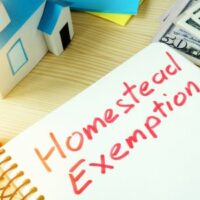Understanding The Florida Bankruptcy Homestead Exemption

Any debtor who is filing for personal or consumer bankruptcy in West Palm Beach should understand how bankruptcy exemptions work, paying particular attention to the homestead exemption if that debtor is a homeowner. Florida’s homestead exemption is extremely generous, and it allows debtors in Florida to exempt more equity in a home than most other states in a bankruptcy case. Yet it will not apply in all circumstances, and it is also critical to understand how you may have additional options for exempting assets if you are not using the homestead exemption. What do you need to know about the homestead exemption in Florida? Our West Palm Beach bankruptcy lawyers have information to help.
How the Florida Homestead Exemption Works
The Florida homestead exemption allows a debtor who is filing for bankruptcy to exempt an unlimited amount of equity in their home. What does this mean for you if you have filed for bankruptcy in Florida and you own a home? It means that the equity in your residence cannot be liquidated in a Chapter 7 bankruptcy case, and it cannot be used to determine the amount of debt that must be repaid in a Chapter 13 repayment plan. To be clear, all of the equity in your home is exempt.
In underscoring the significance of Florida’s homestead exemption, the federal bankruptcy exemptions are instructive. Under the federal exemptions, a debtor can exempt up to $27,900 of equity in their primary residence. It is important to be clear that Florida debtors who file for bankruptcy in Florida must use the state exemptions and not the federal exemptions. While some states allow debtors to choose between the state exemptions or federal exemptions, Florida is not one of those states.
Requirements for the Florida Homestead Exemption
In order to be eligible for the Florida homestead exemption when you file for bankruptcy in Florida, all of the following must be true:
- Property must be your primary residence (i.e., it cannot be a second or vacation home, and it cannot be a rental property); and
- You owned the property for at least 1,215 days prior to your bankruptcy filing.
In addition, it is important to know that the ability to exempt an unlimited amount of property requires that the property be no larger than 0.5 acres if it is located within a municipality, or no larger than 160 acres if it is not located within a municipality.
If You Do Not Use the Homestead Exemption
If you are planning to file for bankruptcy in Florida and do not own a home, or you do not have much if any equity in a home you own, it might make sense to forego the homestead exemption in order to have a larger “wildcard” exemption. Under Florida law, if you do not use the homestead exemption, you will be able to exempt up to $4,000 of property of your choice through the state’s wildcard exemption.
Contact a Bankruptcy Attorney in West Palm Beach
Whether you have questions about the Florida homestead exemption in your bankruptcy case or you need general assistance with bankruptcy, one of our West Palm Beach bankruptcy attorneys can assist you. Contact Kelley Kaplan & Eller today for more information.



